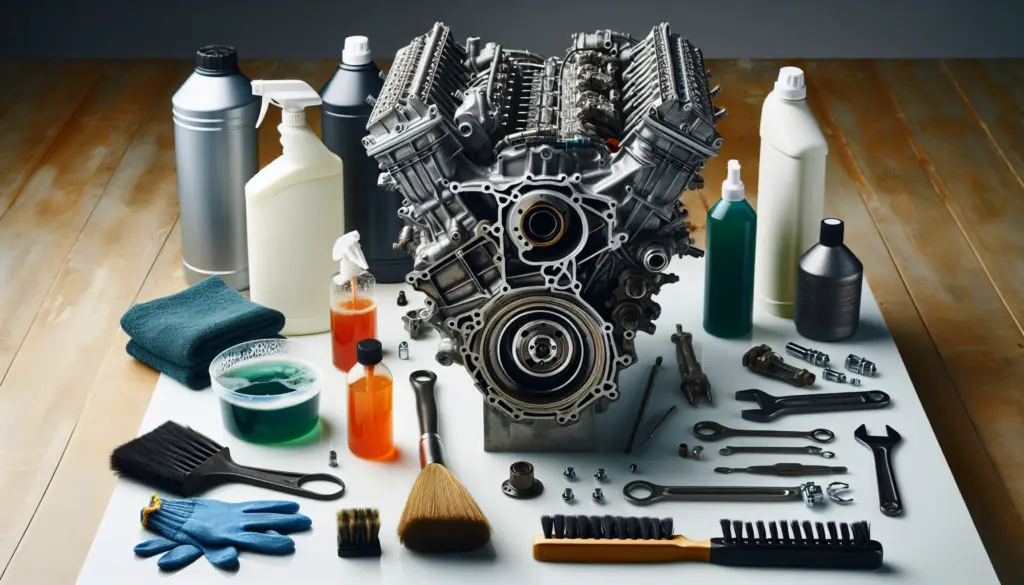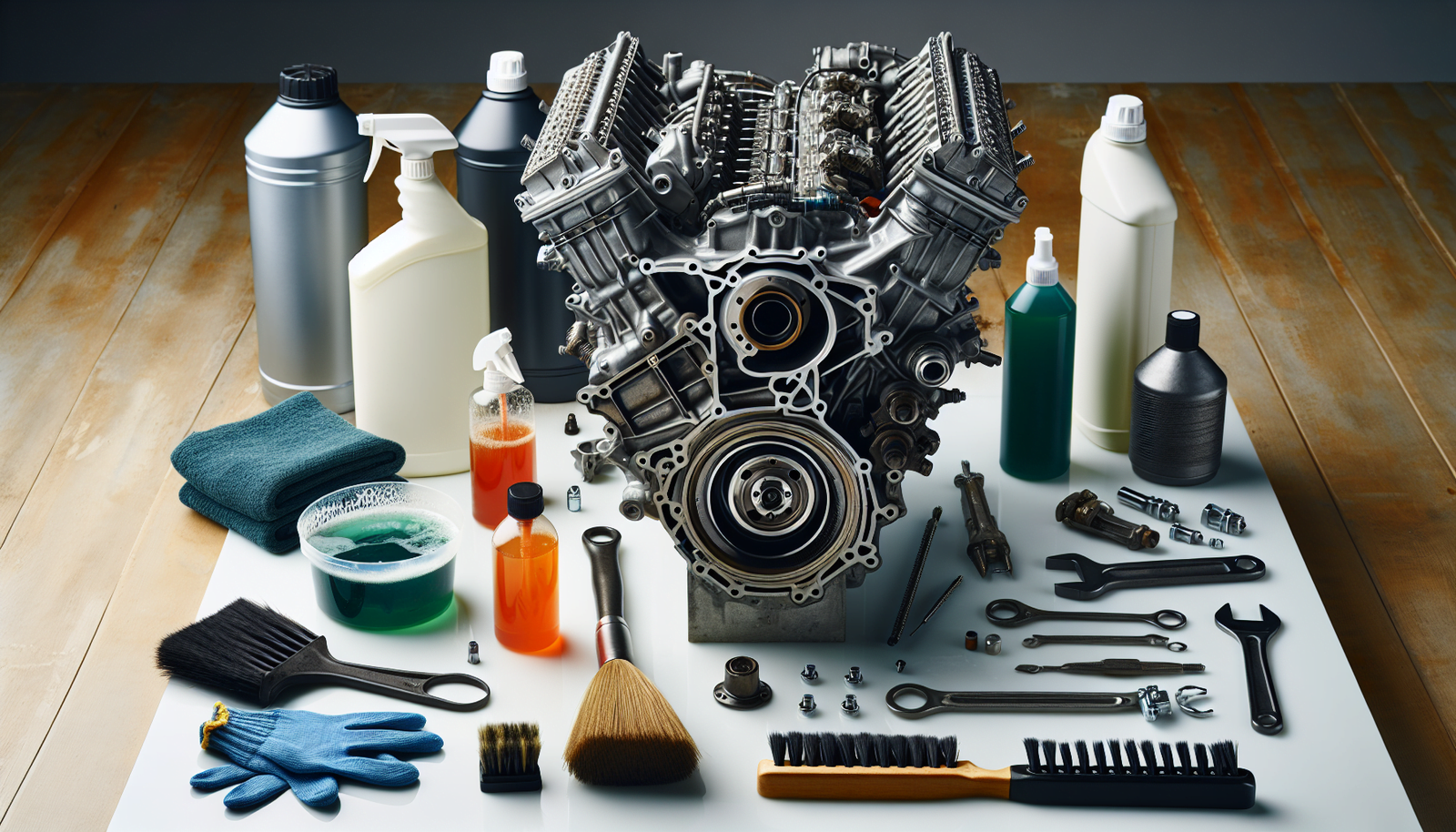Navigating through the open seas and tranquil rivers in your own boat can be one of life’s great pleasures. However, like any other prized possession, your boat requires diligent care and attention. Specifically, the boat engine – the heart of your water vessel needs regular cleaning and maintenance. “How To Properly Clean And Maintain Your Boat Engine” offers an in depth guide on keeping your boat engine running smoothly and efficiently, thereby extending its lifespan and ensuring your sailing adventures continue without a hitch.
Understanding the Importance of Boat Engine Maintenance
Proper maintenance is a major factor in ensuring the long-term performance and reliability of any mechanical device, and boat engines are no exception.
The critical role of routine maintenance
Routine maintenance is your first line of defense against potential problems. Not only does it extend the life of your boat’s engine, but it can also help prevent the kinds of mechanical failures that can leave you stranded on the water. You will also avoid the inconvenience of breakdowns and malfunctions and enjoy smoother rides.
The financial benefits of timely engine care
Keeping up with routine maintenance is also a smart financial move. Boat engines can be expensive to replace, but with proper attention and care, you can avoid the premature need for a new engine and costly repairs. By keeping your engine in top condition, you ensure it functions efficiently, which in turn results in significant fuel savings.
How regular engine care contributes to safety
Safety is another important aspect to consider. Neglecting engine maintenance could lead to failures that are not just inconvenient, but dangerous. Picture yourself out on the open water when your engine suddenly dies. Keep your safety, and that of your passengers in mind by regularly checking the condition of your boat engine.
Getting to Know Your Boat Engine
A boat engine isn’t overly complex, but it does have several critical parts that all play a role in its function.
Understanding the different components of a boat engine
Several components make up a boat engine, including the ignition system, the fuel system, the lubricating system, the cooling system, and the exhaust system. As a result, an engine requires a multifaceted approach to maintenance that includes using the right fuel and engine oil, ensuring it is adequately lubricated, keeping the cooling system working optimally, and checking the exhaust for any dysfunction.
Differentiating between inboard and outboard engines
Boat engines come in two main types: inboard and outboard. Inboard motors are located inside the boat’s hull, while outboard engines are attached to the back of the boat. Each type has its own specific features and maintenance requirements, so be sure to understand which is best for your vessel and how to properly maintain it.
Role and importance of each engine component
Every component of your boat’s engine plays a critical role in its overall performance. For instance, the ignition system starts the engine, the fuel system feeds it, the lubricating system keeps parts moving smoothly, the cooling system prevents overheating, and the exhaust system expels waste gases. Ignoring problems with any one part can have a significant impact on the overall health and efficiency of your engine.
Routine Cleaning of Your Boat Engine
Regular cleaning is one of the most basic, yet important, aspects of boat engine maintenance.
How often to clean your boat engine
Cleaning your engine not only keeps it running smoothly but also helps you spot potential issues before they escalate. While there’s no hard and fast rule, a good guideline is to clean your engine every 100 hours of operation or at least once a year.
Choosing the right cleaning products
Whenever possible, stick with cleaning products recommended by your engine manufacturer, as these will be specifically formulated to deal with the kind of grime and debris common to boat engines. Always avoid using products that can cause corrosion or other damage to your engine.
Step-by-step process of thorough boat engine cleaning
A thorough clean involves protecting electrical components, then using an engine degreaser before rinsing with low-pressure water. Once it dries, apply an anti-corrosion spray. It’s a rather straightforward process but could make a significant difference in early problem detection and increasing the life of your engine.

Maintaining the Fuel System
The fuel system is one of the most critical areas of your engine and thus needs careful attention.
Checking for leaks in the fuel line
Regularly inspect your fuel lines for signs of wear, including cracks, bulges, softness, or other signs of damage. Should there be any leaks, it’s crucial to get them repaired straight away, as they could lead to both engine trouble and dangerous situations.
Replacing fuel filters when necessary
Fuel filters are there to protect your engine from harmful debris and particles that can get mixed with your fuel. A blocked or dysfunctional filter could lead to significant engine problems, so it’s advisable to replace your filters at least once a year.
Understanding the importance of fresh fuel
Fuel left in your boat’s tank for a long time can get contaminated and cause problems in your engine. For this reason, always use fresh fuel for your trips and add a stabilizer if you won’t be using the boat for a while.
Boat Engine Lubrication
Lubrication is key to preventing friction between moving parts in your boat’s engine.
Understanding the importance of proper lubrication
Dirt and other particles can cause significant wear and tear on your engine, leading to inefficiency and shortened engine life. Proper lubrication helps to reduce this friction and wear, giving your engine a longer, healthier lifespan.
Choosing the right engine oil
Not all marine engine oils are created equal. Always use high-quality engine oil recommended for your specific boat engine type. It’s a small cost for maintaining your engine over its lifespan.
How and when to change the engine oil
Changing your engine oil flushes out particles and sludge, maintaining engine performance. As a rule of thumb, change the oil every 100-200 hours, depending on your manufacturer’s instructions.
Battery Maintenance
Taking good care of your boat’s engine also means taking care of its battery.
Proper removal and cleaning of the battery
Properly disconnecting and removing the battery for regular cleaning helps prevent any build-up of acid or debris that could affect performance. Clean the battery using a mixture of baking soda and distilled water to neutralize the acid and remove any borrosion.
When to replace boat engine batteries
Batteries wear out over time and eventually need replacing, preferably every 3-5 years. Always replace them with batteries designed for marine use as they’re built to handle the marine environment.
Ensuring optimal battery life
To ensure optimal battery life, keep the battery charged, avoid deep discharging, and keep corrosion at bay. Proper maintenance can add years to your battery’s life and keep your engine running.
Inspecting and Changing Boat Engine Belts
Engine belts play a crucial role in the functioning of your boat’s engine.
Identifying worn-out belts
An engine belt in good condition should be free of cracks, frayed edges, or excessive looseness. If the belt shows any of these signs or makes a screeching noise, it might be time for a replacement.
Replacing engine belts
Engine belts are relatively inexpensive to replace but can cause costly damage if they fail. Having some spares on board is always a good idea, and regularly replacing them can save you time, money, and potential engine trouble down the line.
Ensuring your belt is the correct tension
A belt that is too tight or too loose can cause problems like overheating or battery charging issues. Always ensure that your belt has the correct tension as per the manufacturer’s guidelines.
Maintaining Cooling Systems
A working cooling system is paramount to stopping your boat’s engine from overheating.
Understanding the function of the cooling system
A boat engine’s cooling system is crucial in maintaining the engine’s temperature at an optimal level. When functioning properly, it reduces the risk of overheating, thus, prolonging your engine’s life and performance.
How to spot potential cooling system issues
Common signs of cooling system problems include overheating, a strong smell of antifreeze, or visible leaks. Regularly checking the coolant level, color, and consistency can help avoid these issues.
Flushing the cooling system
Every so often, the cooling system needs to be flushed to remove any debris and to replenish the system with fresh coolant. Always use marine-grade coolant and deionised water for this task.
Taking Care of Boat Engine Filters
Engine filters trap contaminants and help keep your boat’s engine clean.
Understanding the role of filters in boat engines
Filters stop impurities from entering your engine. These impurities could damage critical engine parts and reduce its overall performance. Regularly changing filters is, therefore, key to maintaining engine health.
Changing and cleaning filters
Different engines and manufacturer guidelines can vary on how often to change your filters. As a general rule though, change your oil and fuel filters at least once a year or whenever they appear dirty.
Choosing the right filters for your engine type
Always use high-quality filters specifically designed for your boat’s engine. The wrong filter can lead to worse outcomes than not using any filter at all.
Seeking Professional Help for Boat Engine Maintenance
While most of the upkeep can be done yourself, sometimes professional help is necessary.
When to call in a professional
If your engine isn’t starting, is making unusual noises, or is overheating despite your maintenance efforts, then it’s time to call in the professionals. Repairs can be complicated and require specialist tools or skills.
Choosing a reliable boat maintenance service
When it comes to choosing a professional boat maintenance service, look for trained and certified technicians who specialize in your particular boat and engine types. Above all, they should have a good reputation and reliable customer service.
Understanding what to expect from professional engine service
A professional service should be able to provide thorough engine inspection and maintenance, clear communication about any recommended work, and fair pricing for their services. Remember that while these services can be costly, they are cheaper than a new engine!
In conclusion, a little bit of effort towards maintenance can significantly prolong your boat engine’s life, enabling you to enjoy your time on the water with peace of mind.


[…] clean boat engine is crucial for the smooth running of the machine. Here’s how you do […]